Ducking opponents? No way: From THE RING Magazine
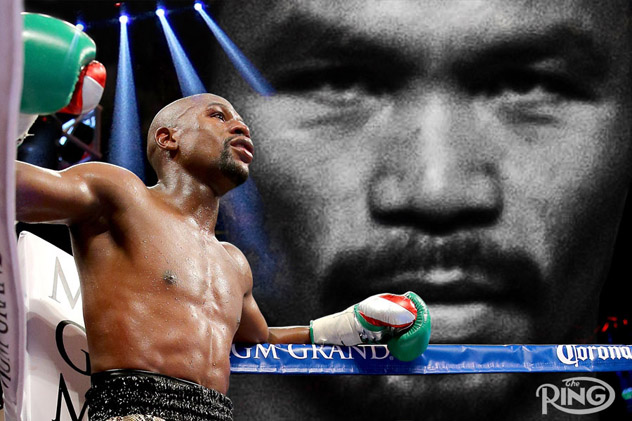
MAYWEATHER VS. PACQUIAO: MAY 2
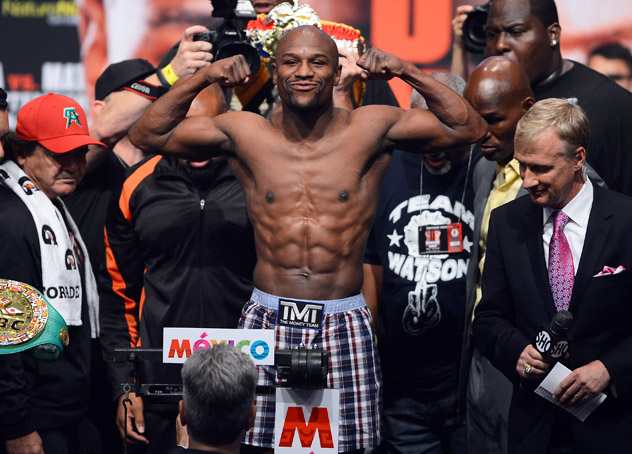
Floyd Mayweather Jr. weighs in for his fight against Canelo Alvarez in 2013. Photo by Ethan Miller/Getty Images.
This is the third in a series of stories on Floyd Mayweather Jr. and/or Manny Pacquiao that appeared in THE RING Magazine in recent years. This opinion piece on Mayweather, written by Ron Borges, originally was published in the June 2014 issue, prior to the first Mayweather-Marcos Maidana fight. The current issue — previewing the May 2 fight — is on newsstands now. Don’t know where to find a newsstand near you that sells it? Click here. To subscribe — both to the print and digital versions — click here. You can also purchase the current issue on that page.
YES, FLOYD MAYWEATHER JR. SELECTS FOES AS HE SEES FIT. THAT DOESN’T MEAN HE HAS AVOIDED ANYONE.
Boxing, at its best, is the dark art of illusion. No one knows that better than Floyd Mayweather Jr., who is the fistic equivalent of David Copperfield. He is the game’s master illusionist.
Mayweather exhibits that every time he steps into the ring, mesmerizing into near-immobility almost all the opponents he has faced with rapid movement of body and mind. Those skills have left him undefeated at age 37 and almost always unchallenged. Yet his critics argue the latter is in part because he is as much an illusionist outside the ring as inside it.
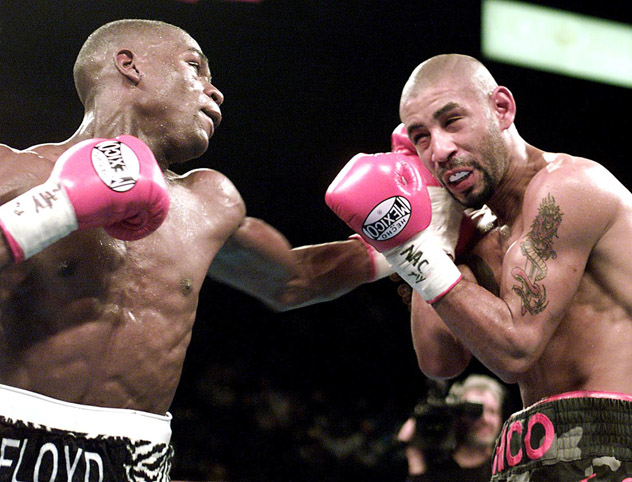
Photo by John Gurzinski/Getty Images
Because of his power in the marketplace as boxing’s highest-paid prize fighter, Mayweather dictates not only terms but also opponents. Everyone in his weight classes and bigger ones, such as middleweight champion Sergio Martinez, have pursued him by willingly accepting catchweights, giving up world titles or conceding financial and fistic advantages for the opportunity to cash in on the revenue his fights produce. This allows him almost carte blanche to pick his opponents, as he proved again recently when he launched an internet poll for fans to select his May 3 opponent from a field of two, Amir Khan and Marcos Maidana.
The fans chose Khan. Mayweather soon chose Maidana, proving once again that just when you think he’s here, he’s over there. And when you think he’s over there, he’s standing here and hitting you with a counterpunch. After the choice was made, Mayweather declared, “Look at [Maidana’s] last four fights (four wins, three knockouts and twice dropping Mayweather protege Adrien Broner on the way to a clear decision) and look at Khan’s (2-2 including a KO loss to Danny Garcia). I had to go with the best choice.”
Mayweather’s critics immediately wondered: “For whom?”
If there is a primary knock on Mayweather, it is the sense his critics have that he handpicks his opponents, which frankly he does. Then again, what great fighter who rose to his station didn’t?
Sugar Ray Leonard certainly was the master of that, taking on his most dangerous opponents at the best possible time for him and refusing to grant the most competitive ones rematches until they were well past their primes or in some cases (Marvin Hagler immediately comes to mind) not at all. Yet who would argue Leonard didn’t face the best of his time?
Wilfred Benitez? Check. Tommy Hearns? Check. Roberto Duran? Check. Hagler? Eventually check but a little late on that one. Did he manipulate all of them in one way or another through the power he carried in the marketplace? Absolutely. So what? He fought them, didn’t he?
At 37 and universally acclaimed the best pound-for-pound fighter in the world, Mayweather has fought his way into the same financial and negotiating position Leonard once held, dictating terms and selecting the opponents he feels best fit his needs. He willingly conceded as much after settling on Maidana when he said, “I’ve earned my stripes and fight who I want to fight. Nobody is forced to watch.”
Yet they do, whether it’s against Canelo Alvarez, who though non-competitive was the B-side of the highest grossing pay-per-view show in history, or Maidana, who most experts believe is whatever the word for more than a prohibitive underdog would be (“sacrificial lamb” comes to mind).
Acknowledging that Mayweather fights who he wants, who did he miss in his career? My respected colleague at THE RING, Doug Fischer, insists Mayweather avoided the likes of Kostya Tszyu, Joel Casamayor, Acelino Freitas, Steve Johnston and Antonio Margarito.
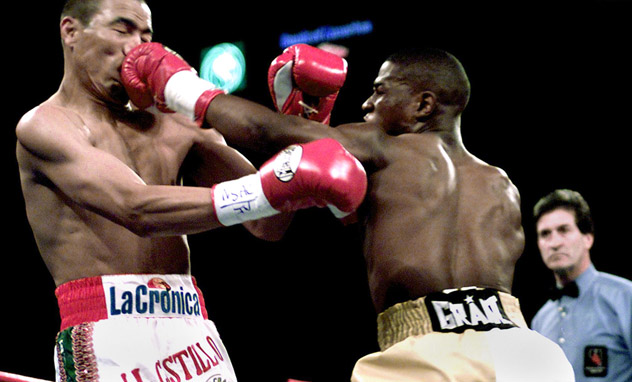
Photo by John Gurzinski/AFP-Getty Images
Let’s take a closer look at that and Mayweather’s overall resume.
On the issue of not fighting Tszyu, timing was as much a factor as anything. Mayweather twice won WBC title eliminators at 140 pounds, over DeMarcus Corley on May 22, 2004, and Henry Bruseles on Jan. 22, 2005. Prior to that, Mayweather had won the WBC lightweight title from Jose Luis Castillo on April 20, 2002, a controversial decision that led Mayweather to give him an immediate rematch eight months later. He defended that 135-pound title three times before moving up to 140 in the first of those title eliminators. Less than a year after Mayweather moved up, Tszyu retired.
In the interim, Tszyu came off a 22-month layoff and made his last successful title defense on Nov. 6, 2004, beating Sharmba Mitchell with only the IBF title at stake. You really think he wanted Mayweather after nearly two years off? Seven months later Tszyu was pummeled by Ricky Hatton before retiring on his stool after the 11th round, having grown visibly old in the middle of that fight. He never fought again.
Perhaps one can argue Mayweather could have moved up sooner, but from the time he won the first WBC title eliminator at 140 to Tszyu’s retirement was a span of 11 months and 17 days. So just how much avoidance was there, especially when you consider that Tszyu first won the 140-pound title in 1995, when Mayweather was still an amateur?
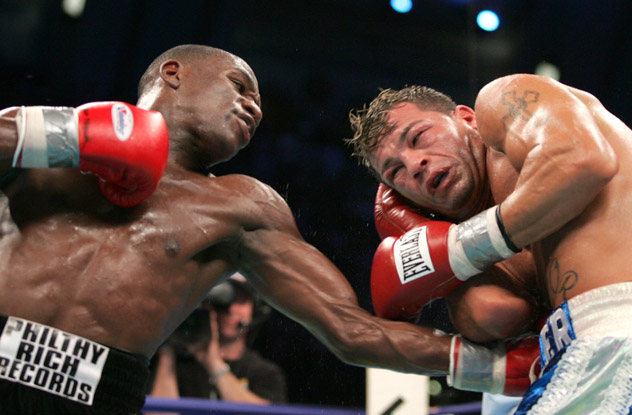
Photo by Ed Mulholland/Getty Images
A month after Hatton beat Tszyu, Mayweather destroyed Arturo Gatti to win the WBC version of the super lightweight title. If Tszyu got old midway through the Hatton fight to the point where he never boxed again, what would have happened if he’d had to chase Mayweather for 12 rounds? Avoided Tszyu? Not likely.
One can make a reasonable case for Mayweather fighting Casamayor during Casamayor’s first reign as junior lightweight champion between 1999 and 2001, except that neither of them drew flies at that stage of their careers and would have been a stylistic nightmare to watch. Certainly a fight with Freitas after he took the title from Casamayor in 2002 would have been desirable. But by the time Casamayor was splitting fights with Corrales in 2003-04, Mayweather had already moved up in weight and was gone. Same was true with Freitas when he won the WBO lightweight title on Jan. 3, 2004. By then, Mayweather was fighting at 140, a weight Freitas never approached.
As for Margarito, to claim Mayweather avoided him is stretching it. When Margarito first won the WBO welterweight title on March 16, 2002, Mayweather was a lightweight. When Margarito won that title back in 2004, Mayweather was a junior welterweight, while Margarito was considered one of the biggest welterweights in recent memory. By the time Paul Williams beat Margarito on July 14, 2007, Mayweather had been welterweight champion for barely a year and was already headed to the largest pay-per-view fight in boxing history, his victory over Oscar De La Hoya on May 5, 2007, for the junior middleweight title.
Should he have ignored De La Hoya and a pile of cash for Margarito? Would anyone advising Mayweather have suggested he should square off with Margarito for comparative chump change rather than create the all-time PPV viewing record of 2.55 million with Oscar? Need we debate this?
Mayweather fought once more, beating up Ricky Hatton, and then “retired” for nearly two years. By the time he returned, Margarito had disgraced himself, being suspended for a year for fighting with loaded gloves. When he returned without them, he was destroyed by both Manny Pacquiao and Miguel Cotto, the latter of whom Mayweather beat barely six months later.
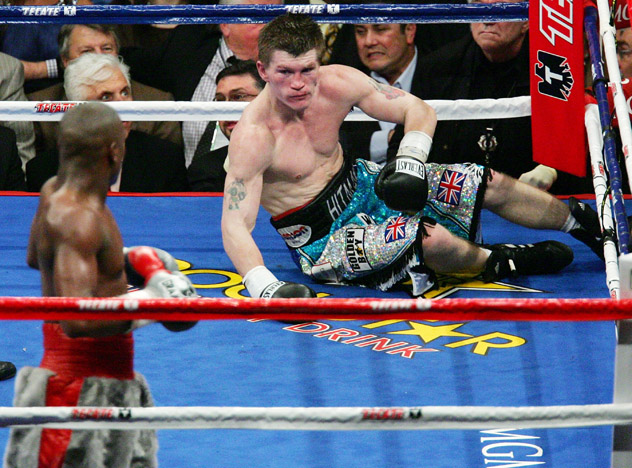
Photo by Ethan Miller/Getty Images
Avoided Margarito? I think not.
A boxing career is more than a collection of every observer’s “dream” fights at any given time and weight. There is timing, experience, drawing power, dueling TV networks, rival promoters and boxing politics that all come into play. While one can make a case Mayweather should have fought at least Freitas, no one with any sense would have paid for a Casamayor match (I’m falling asleep thinking about it). The Johnston argument is a reach. And Margarito was not avoided; he lost at the wrong times and later got caught cheating at the worst of times. Other than that it’s all Mayweather’s fault.
As for Manny Pacquiao, there is ample blame to go around for why these two haven’t faced each other, but the fact is they fought for bitter rival promoters and had exclusive deals on rival cable networks much of the time. Add to that Pacquiao’s early refusal of random blood testing for performance enhancing drugs (a stipulation he later agreed to) and Mayweather’s later refusal to face anyone promoted by Bob Arum, and you have the kind of ego-fueled logjam that resulted in Lennox Lewis and Riddick Bowe never squaring off and Evander Holyfield and Mike Tyson not getting around to each other until both were past their primes.
Does more blame belong to Mayweather than Pacquiao? I think not. The fact is when either thought they had the upper hand, they and their representatives acted in ways that made it impossible to come to an agreement. Mayweather’s critics have postulated repeatedly that this was because he had grown so obsessed with the “0” in his record – now at 45-0 – he was unwilling to take a chance.
If he was that kind of fighter, why give Castillo an immediate rematch after their first fight was so close? If that was the case, why take a chance against an admittedly dissipated but still dangerous Shane Mosley or step in with the naturally larger De La Hoya or face Zab Judah, who was a hard-punching version of what Mayweather is?
“Floyd Mayweather is not scared of any opponent,” he insisted after choosing Maidana over Khan. Certainly it’s difficult to fathom any reason he’d be fearful of Khan, whose chin has proven less than resilient and who would struggle to find a way to land a combination on Mayweather.
Another knock on Mayweather has been his well-chronicled familial and legal problems, which recently flared anew. Those factors combined to land him briefly in a county lockup in 2012 but, when compared to many of boxing’s troubled legends, they pale in comparison.
Does he brag to excess and throw money around as if he has no idea of its value? He does. But much of that is a carefully crafted persona designed to sell himself to an often disinterested and unfocused public. When Arum was promoting him as “Pretty Boy Floyd,” he couldn’t give tickets away. Since he became “Money Mayweather,” head honcho of the Money Team, he has become a national phenomenon with a six-fight Showtime contract guaranteeing him over $200 million if he completes it. That persona may be a turnoff to his critics, but it has meant big box office for Mayweather and the sport. Master Illusionist wins again.
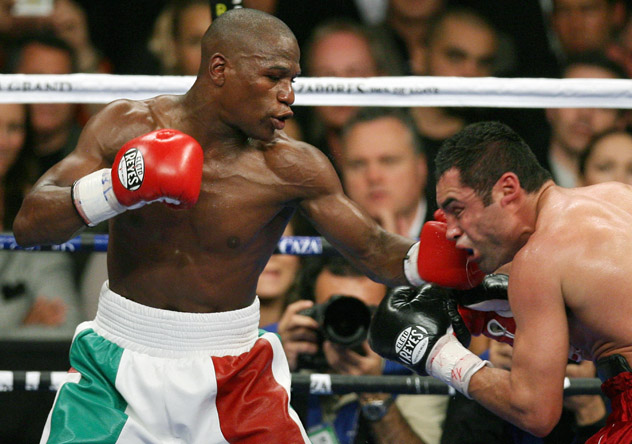
Photo by Gabriel Buoys/AFP-Getty Images
As for those who think his resume is full of holes, did he not beat Genaro Hernandez (38-1-1) in his 18th professional fight to win his first world title when many felt he was being overmatched? Did he not give Castillo (45-5-1) an immediate rematch when there was nothing but his own ego compelling him to do so? Did he not destroy then-undefeated Diego Corrales (33-0), knocking him down five times before his corner threw in the towel? Did he not outfox and outlast De La Hoya (38-4), out-think and out-punch Judah (34-3) and Hatton (43-0), outbox Miguel Cotto (37-2), absorb Shane Mosley’s (46-5) best shots and out-and-out dominate Alvarez (42-0-1)?
When it’s all said and done, if the knock on Mayweather is that he missed out on Tszyu, Margarito or Johnston, there are ample explanations for why that had more to do with timing and business than any character flaw. And frankly, do you really believe they would have beaten him at the time they most likely would have fought?
Then again, if it’s that he talks too much or boxes so well that nearly every fight ends up a one-sided episode of “Dancing With the Star,” then it says more about his critics then it does about him. In the end, the fact of the matter is Floyd Mayweather Jr. is the best boxer of his time, and there’s a large gap between himself and second place. That’s how he will be remembered decades from now, when memories of Stevie Johnston or Antonio Margarito or Joel Casamayor or Acelino Freitas have long dulled and faded. Surely they’ll ask why he never fought Pacquiao if he doesn’t, but they’ll ask Pacquiao the same question if they’re honest about it, and neither will have a satisfactory explanation.
As for his latest choice of opponents, do you really believe he chose Marcos Maidana because he isn’t convinced he can beat Amir Khan? If you sincerely do, there’s only one question left to ask: Do you need your head examined?
MAYWEATHER’S TOP 10
The 10 most important victories in Floyd Mayweather Jr.’s career (in chronological order):
Genaro Hernandez, TKO 8 (1998): Schooled one of the best boxers of the era to win his first title.
Diego Corrales, TKO 10 (2001): The feared and then-unbeaten slugger went down five times.
Jose Luis Castillo I, UD 12 (2002): Some believe Mayweather received a gift decision in a close fight.
Jose Luis Castillo II, UD 12 (2002): Mayweather won the rematch somewhat more convincingly.
Arturo Gatti, TKO 6 (2005): The mismatch was Mayweather’s debut as a PPV headliner.
Zab Judah, UD 12 (2006): Dominated an opponent with similar – but inferior – tools.
Oscar De La Hoya, SD 12 (2007): Outboxed the bigger and still-capable Golden Boy.
Ricky Hatton, TKO 10 (2007): Had no trouble with the then-unbeaten and highly hyped Briton.
Shane Mosley, UD 12 (2010): Mosley had just KO’d Antonio Margarito but couldn’t hang with “Money.”
Canelo Alvarez, UD 12 (2013): Proved that the youngster isn’t in his class and made a windfall.
This opinion piece originally was published in the June 2014 issue of THE RING, prior to the first Mayweather-Maidana fight. The current issue — previewing the May 2 fight — is on newsstands now. Don’t know where to find a newsstand near you that sells it? Click here. To subscribe — both to the print and digital versions — click here. You can also purchase the current issue on that page.














